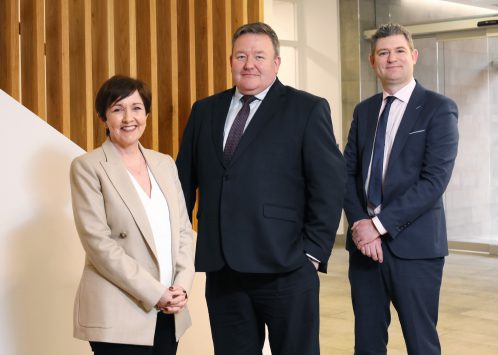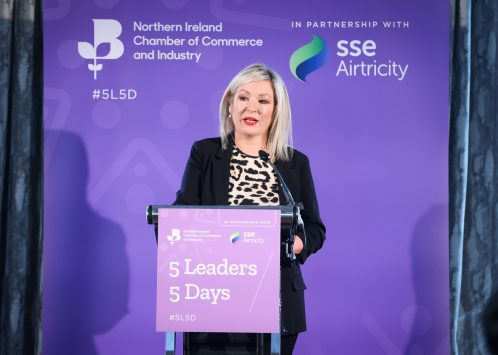- Inflation is a concern for 86% of NI Chamber members
- 77% of respondents expect to raise prices in next 3 months
- Cash flow position is very weak, particularly for the manufacturing sector
- 89% are experiencing recruitment difficulties
- 50% of members expect to offer a hybrid model of working going forward
Download a copy of the report here.
Inflationary pressures from mounting business costs, including high raw material costs are causing significant concern for businesses in Northern Ireland. According to the latest Quarterly Economic Survey report for Q1 2022, published today (6 April 2022) by NI Chamber and BDO NI, expectations to raise prices are at the highest level on record.
The extent to which inflationary pressures are impacting on businesses, particularly manufacturers, is striking. 77% of firms who responded to this survey expect to raise prices in the next three months, driven in large part by high raw material costs. Almost 4 in 5 (77%) cite rising raw material costs as the main driver of price rises.
The majority of businesses are feeling growing pressure to increase wages in 2022, set against a backdrop of significant difficulties in recruiting and retaining staff at all skills levels.
Manufacturing
Northern Ireland’s manufacturers have experienced a challenging start to the year. While almost all key indicators remain positive, suggesting more firms are growing sales and jobs, three key indicators turned negative in Q1 22 – cash flow, confidence around profitability and capital investment intentions.
The sector’s weakest indicator is cash flow. Northern Ireland is also the bottom-ranking region in terms of domestic sales, confidence both in turnover and profitability growth in the next 12 months and investment intentions. Inflationary pressures are very severe for the sector. 88% of manufacturers are expecting to raise prices, highest across the UK regions, with 95% citing rising raw materials costs as the key driver. In addition, pressure from pay settlements (43%) remains one of the highest across the UK regions (UK 36%).
Services
The service sector recovery continues, although cost pressures dominate for the sector also. Sales and export indicators improved in Q1 22 and all key indicators are positive, with the exception of the cash flow balance, which is zero.
The sector’s regional performance remains positive and is particularly strong around export sales/orders. Expectations around employment growth are highest on record and Northern Ireland is the strongest regional performer in terms of investment in training. However, expectations to raise prices are high (68%) and inflation continues to grow as a concern (85% Q1 22 vs. 76% Q1 21).
Trading arrangements
In Q1 22, 65% of NI Chamber members said that they had adapted to the new trading arrangements (52% in Q2 21). 29% are finding trading conditions challenging (down from 37% in Q2 21). A smaller share of businesses are finding the new trading arrangements extremely challenging (8% vs.16% Q4 21).
In terms of dealing with the new arrangements, around half of members (48%) have had to use existing/new staff resources and/or pay for external support to deal with new trading arrangements. One in 3 members (36%) have had to divert internal resources specifically to deal with the new rules and paperwork involved.
Covid-19 recovery
There were some signs of weakening in the COVID recovery path for Northern Ireland businesses in Q1 22, dominated by huge cost pressures. While 79% of businesses are trading positively, one in 5 (19%) are just about covering costs or are struggling/on the verge of closure. Almost 1 in 3 (30%) have yet to recover to pre-COVID trading levels.
Working models
Going forward, 50% of members expect to offer a hybrid model of working involving a combination of home and office/premises based working, while 44% expect staff to work full-time in the office/premises. Just 6% will expect staff to work at home as much as possible. More manufacturers (52%) will expect full-time working in premises compared to services (42%).
Commenting on the survey findings, Ann McGregor, Chief Executive NI Chamber said:
“Businesses are trading in a hugely complex economic climate, including a perfect storm of cost pressures that now also has to take into consideration the fall-out of the war in Ukraine.
“The most striking issue is the extent to which inflationary pressures are impacting on businesses, especially manufacturers. Deteriorating cash flow positions are concerning, as this leaves firms more vulnerable to economic shocks, including the damaging impact of soaring energy bills, higher inflation, and tax increases.
“Northern Ireland has had skills gaps for years, but the skills crisis is now becoming tangible, to the extent that in Q1 22, 91% of manufacturers and 86% of services were finding it difficult to get staff.
“While it is good to see that a majority of businesses were trading positively in Q1, there is concern that our recovery from the pandemic is slowing down, as a result of significant cost pressures businesses in all sectors are facing. The current cost of doing business crisis is squeezing firms’ finances, driving further increases in prices and fuelling the cost-of-living crisis. Today’s report is further evidence of the need for the UK Treasury to revisit some of the opportunities to support businesses which were missed in the Chancellor’s Spring statement, including postponing the National Insurance increase.”
Brian Murphy, Managing Partner, BDO NI added:
“If recent years have taught us anything, it’s that the business community needs to be prepared for the unexpected and must be able to quickly adapt to changing circumstances.
“That said, and even with inflationary pressures and recruitment challenges in the marketplace, it is reassuring to see such positivity in these results.
“There is a lot to welcome within last quarter’s survey results, with almost all indicators being positive, and firms reporting increased sales and greater confidence around turnover expectations, investment intentions and growth, along with plans for job creation and employment with over two in three firms seeking to recruit.
“However, inflationary pressures loom large for many. Costs are going up, and with 86% of businesses under pressure to increase wages, so prices will also have to go up, with concerns about profit margins being squeezed. Businesses appear to be using their cash reserves to get through this period of high inflation, but this cannot be maintained for long. As a result, 77% of respondents expect to raise prices in the next three months and if not brought under control, inflationary pressures could lead to product shortages and potentially delays in capital projects.
“We also continue to face an issue that existed even before the pandemic hit, with 89% of those businesses that are recruiting facing difficulties in attracting suitable candidates, it’s clear that these problems have been compounded over the last two years. The incoming Northern Ireland Executive will need to address this issue with urgency if the economy is to continue to grow.
“As businesses return to their offices and workplaces, with 50% planning a hybrid model and 44% aiming to bring staff back to the workplace fulltime, it is notable that over three in ten employers are finding it difficult to get people back to work.
“As these findings allow us to reflect on how far we have come, we should recognise how well so many firms have emerged from the battle with the pandemic, and we must continue to channel that same level of innovative thinking and harness our resolve that served us so well with Covid, to ensure we are able to deal with the challenging days ahead.”
Download a copy of the report here.


